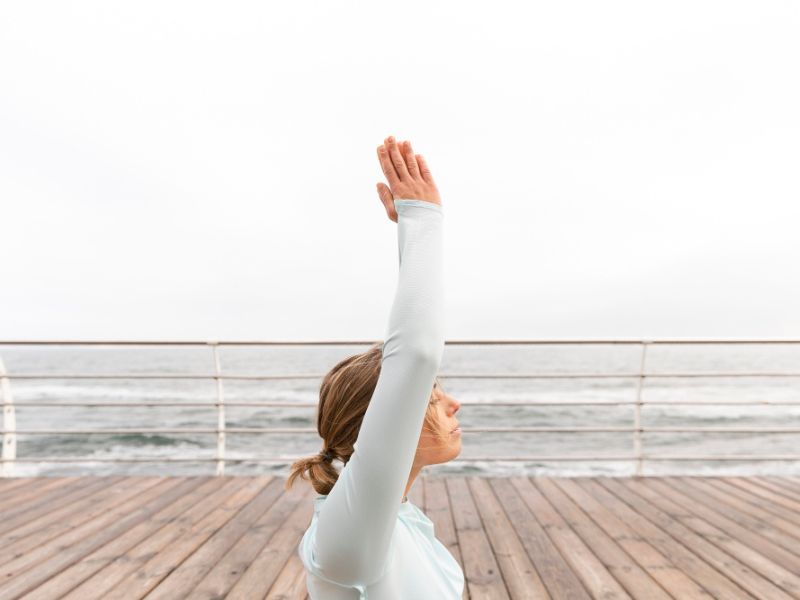
By Jessica Forster
When life gets busy and stressful, one of the first things to feel the effect is our sleep.
The recommendation is for adults to get between 7-9 hours of sleep each night, however, this is far from reality for a lot of people. Dr Holly Milling, Clinical Psychologist and Founder of The Sleep Practice, partnered with Direct Line to conduct a “Need for Sleep” study of 4,000 adults. They found that 71% of UK adults are getting less than 7 hours of sleep, with one in seven getting less than 5 hours per night. You are not lazy or overly sensitive if you have an unproductive or emotional day following a bad night’s sleep. That is the result of sleep deprivation. It is valid, and debilitating and many people experience it as an ongoing problem. It is not fair to expect yourself to continue functioning as normal when your body isn’t being recharged properly.
Sleep is when our bodies undergo critical processes, such as tissue repair, memory consolidation, and hormone regulation. This means that when we consistently fail to get enough sleep, we subject ourselves to a range of detrimental effects. These can include impaired cognitive function, reduced immune system efficiency, increased risk of chronic diseases like diabetes and heart disease, mood disturbances, and weight difficulties due to disrupted hunger-regulating hormones. As serious as all of these issues are, there are many realistic and sustainable ways that you can help yourself to get the rest you need.
Sleep isn’t just about getting enough hours; it’s about aligning our sleep patterns with our body’s natural rhythms, known as circadian rhythms, for better quality sleep. Circadian rhythms are like the internal, natural clock that regulates a wide array of physiological processes. These rhythms follow a roughly 24-hour cycle and are our body’s way of orchestrating our biological functions to align with the day-night cycle, ensuring that we are alert and active during the day and ready for restful sleep at night. If your circadian rhythms are receiving too many disruptions and conflicting information then you will likely experience lethargic mornings and sleepless nights. Understanding and harmonising with these rhythms requires only a few manageable changes and can have a profound impact on your overall health and quality of life.
Blue light
Morning sunlight exposure boosts alertness, enhances your mood and helps synchronise your internal clock. Sunlight contains a substantial amount of blue light, which plays a crucial role in suppressing the sleep-inducing hormone melatonin and signalling to your body that it’s time to wake up. As much as I’m sure we’d all love it, it’s not practical for a lot of people to spend the whole morning sunbathing on the beach. But to reap the benefits, you only need to aim for about 20-30 minutes of outdoor exposure within the first hour of waking up.
If possible, this could be achieved by going for a walk before starting your day. However, even if you have a busy morning routine there are ways to get the sunlight you need in bits and pieces. Try stepping outside for your morning coffee and eating your breakfast or get a few minutes of sunshine while you brush your hair and teeth. If you have to get on with work very soon after waking up then you could try taking your first couple of calls and checking your emails while you’re outdoors. Even getting yourself next to an open window for some rays can help. If you’ve got an early start or won’t have the chance to get any sunlight first thing when you wake up, then you could consider a light therapy sun lamp. They mimic the effect of sunlight with artificial light and can help to synchronise your circadian rhythms.
During the evening, we want to limit our exposure to blue light so that our body produces melatonin. Device screens such as phones, tablets, laptops and TVs emit artificial blue light. Too much exposure will disrupt your circadian rhythms, make it harder to fall asleep and reduce your sleep quality. A survey conducted by SleepFoundation.org in 2022 reported that 73.1% of people say that they watch TV right before going to bed just because it’s a habit. Ideally, try to avoid using screens leading up to bedtime and opt for more sleep-friendly activities, but if you have to work late or it’s family movie night then there are still ways to reduce the impact. Try wearing blue light-blocking glasses and using apps that apply blue light filters to your devices past a certain time.
Routine
Your circadian rhythms thrive off of routine and the more consistent you can be, the better. In an ideal world, you would go to bed and wake up at the same time, even on weekends. If that’s possible for you then it’ll do wonders for your sleep. However, there’s a significant amount of people who can’t have that strict regularity to their schedule because of work, kids, responsibilities, socialising and more. That doesn’t mean your sleep is doomed and that you can’t take advantage of the benefits that habits and routines can offer.
A great way to signal your brain that it’s time for rest is by utilising your senses. Your brain picks up on patterns, just like how Pavlov’s dog learnt that the bell sound meant it was time for food and therefore started salivating. If your body experiences the same sensations before you go to sleep every time, eventually your internal rhythms will take those sensations as the signal for sleep.
Have a strongly scented candle, essential oil or herb bag that you only use before bed, try to choose a soothing scent such as lavender. Create a playlist that helps you to unwind, maybe some jazz music, a bit of classical or try out some ASMR. Turn off all lights and screens except for a low-light side lamp, and choose a caffeine-free herbal tea like chamomile to drink while wrapped up in a fluffy or silky blanket. Choose an activity that relaxes you such as reading, meditating or journaling. They all may seem like small choices but after doing the same routine repeatedly, your body smells the lavender, hears the music, tastes the chamomile, sees the low light, feels the blanket’s texture and knows that it is time for sleep. This is just an example of ways to engage your senses and customise it for yourself by figuring out what relaxes you and what you can do consistently.
Environment
Taking time to optimise your sleeping space will not only make it easier to fall asleep but also ensure your quality of sleep is better by allowing your body to cycle through the essential sleep stages. There are many adjustments you can make for an ideal sleep environment.
Firstly, a cooler room temperature encourages deeper sleep, so ideally aim for 15-20°C. Depending on what you have available to you, this could involve turning down your heating, using air conditioning, turning on a fan or opening windows. Next, you want to ensure you are resting in complete darkness. There are a few options for this, including blackout curtains, a sleep mask and putting stickers over any electronics such as charging and standby lights.
Try to reduce any noise disturbances with earplugs or white noise machines. Finally, try to declutter your space and keep it free from distractions. If possible, leave your phone in another room or keep it switched off. Remove anything that isn’t contributing to your rest and instead be surrounded by soft bedding, calming colours and soothing scents for a truly relaxing sleep sanctuary.
Lifestyle
What we choose to do outside of sleep also has a great impact. For example, consuming caffeine in moderation and limiting it to the first half of your day is an important step for quality sleep. The Journal of Clinical Sleep Medicine published a study in 2013 on the effects of caffeine administered at different times on sleep. They concluded that even when the caffeine was administered 6 hours before sleep, the participants’ sleep was reduced on average by more than an hour.
Try to reduce alcohol intake because although it may make you feel drowsy and help you get to sleep quicker, the quality of sleep is greatly reduced and you will likely wake up still feeling tired. The National Library of Medicine did a study on 4098 people and found that sleep quality was reduced by 39.2% after just one serving of alcohol for women and two servings for men.
Also, avoid heavy or spicy meals before bed as this can lead to discomfort and indigestion and avoid intense exercise as it can elevate your heart rate and body temperature excessively. Instead, try to eat dinner at least a couple of hours before and if you are in the mood for movement then gentle yoga can be a great alternative. Allow yourself time to digest and wind down gradually for optimum sleep.
If you are struggling to sleep despite making multiple changes to your environment, routine and lifestyle then perhaps consider supplements. Some people find relief from insomnia with magnesium or melatonin, however, be sure to discuss with a healthcare professional before starting any treatment.
About the author
 Jessica Forster is a Holistic Health & Wellness Specialist and Founder of Empowered Health Education. As a licensed yoga teacher with qualifications ranging across nutrition, physical training, mental health and hormone management, Jessica works with her clients to map out and execute a balanced health plan that addresses the full picture. She is dedicated to empowering individuals to take control of their own well-being through education, support and personalised guidance. She specialises in providing a practical, realistic and compassionate approach to health, with an emphasis on understanding and supporting the different needs of an individual, instead of a one-size-fits-all mindset.
Jessica Forster is a Holistic Health & Wellness Specialist and Founder of Empowered Health Education. As a licensed yoga teacher with qualifications ranging across nutrition, physical training, mental health and hormone management, Jessica works with her clients to map out and execute a balanced health plan that addresses the full picture. She is dedicated to empowering individuals to take control of their own well-being through education, support and personalised guidance. She specialises in providing a practical, realistic and compassionate approach to health, with an emphasis on understanding and supporting the different needs of an individual, instead of a one-size-fits-all mindset.
Connect with Jessica:








